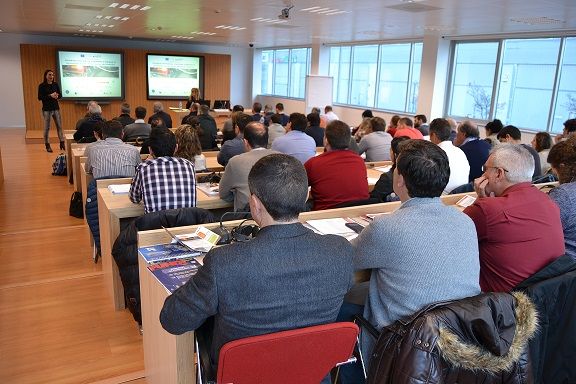The technical workshop “Novel initiatives for stimulating circular economy of foundry sand” took place on November 9th at IK4-AZTERLAN Metallurgy Research Centre facilities. The event was attended by numerous technicians and professionals from the ferrous and non-ferrous casting sector, the auxiliary sector, as well as from construction and waste management organizations, public entities and environment-related associations.
The sustainable management of waste foundry sand is a challenge that concerns the casting sector, which should value 75% of this waste for 2020. The high number of professionals and technicians (around 70) who met on November 9th to discuss novel initiatives aimed at boosting the circular economy of foundry sand made this concern obvious.
The conference has been organized by the consortium companies of the LIFE ECO-SANDFILL project, and was aimed to share advances and experiences in the field of the sustainable management of waste foundry sand through different initiatives and projects implemented. The meeting also sought to present the new challenges posed by the Basque Government’s non-hazardous waste management plan to the sector.

Lucía Unamunzaga, researcher from the environmental area of IK4-AZTERLAN Metallurgy Research Centre
The Foundry sector, a “highly proactive industry” for sustainable waste management
The introduction of the working session has count with the presentation by IHOBE S.A. (Public Society for Environmental Management of the Basque Government), sharing the current situation regarding the management of non-hazardous waste in the Basque Country. Particularly, the presentation focused in the foundry sand and fines management, which are the fifth highest residue in volume within this waste category in this territory. Likewise, IHOBE presented the challenges of waste management proposed by the European Union for 2030 as well as the valorization target settled by the Basque residue prevention and management plan: 75% of foundry sand by 2020. Mrs. Ana Rebate, technician from IHOBE, said that “the foundry sector is a very proactive one, which is ready to give steps in this direction”. Rebate also stressed the importance of “acting from conviction” and pushing initiatives that contribute to value the waste or its recovery processes.
Mr. Marcial Alzaga, General Secretary from the Basque Country and Navarre Foundry Association (AFV), stressed the problems identified at local level to cope with the sustainable management of the waste foundry sand, as well as some of the treatment methods that other European countries are putting into practice.
The waste foundry sand, a waste with value
In the same direction the program of the event allowed the attendees to know the main routes that are currently in phase of exploration for the use of these residual sands in processes and products of different nature, such as: concrete prefabricated materials, mortars, fillings and embankments, cements, ceramic materials, compost substrates….etc. At this point the workshop brought the valorization experiences of companies such as Prefabricados Alberdi, Acciona Construction, Fundiciones del Estanda and Bolaleku S.A.T.
Finally, the researchers from the Environment and Sustainability area of IK4-AZTERLAN Metallurgy Research Center (which are leading several research projects related to this important working line), shared the main conclusions extracted in terms of barriers and opportunities detected in each case of study, in accordance with the sand characteristics and the technical and environmental requirements regarding each application.
Studies on the suitability of use of reclaimed foundry sand in external applications are in many cases promising. This fact serves as a stimulus for foundries, research centers and other potential user sectors of the residue to follow the field of its valorization.
The documentation from the conference is available on the LIFE ECO-SANDFILL project official web site.
About the LIFE ECO-SANDFILL project
The LIFE ECO-SANFILL Project, co-financed by the LIFE program (the European Union’s financial instrument for environment and climate action), aims to demonstrate the technical, environmental and economic viability of the use of foundry residual sand, adequately conditioned by means of innovative mechanical treatments, such as fine aggregates in construction sector applications, specifically in embankments, controlled low-resistance fluid materials (CLMS) and pumpable fluid mortars.
The project will also explore the possibilities of reusing the regenerated residual sands in the casting process itself, for the manufacture of cores and molds as a quality substitute of new sand.
The participants of the project are IK4-AZTERLAN Research Center, ACCIONA CONSTRUCCIÓN S.A., FUNDICIONES DEL ESTANDA S.A., ONDARLAN S.L. and GAIKER-IK4 Technology Center

